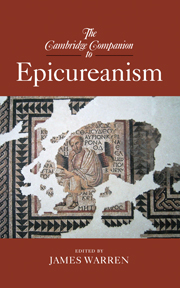Book contents
- Frontmatter
- Introduction
- 1 The Athenian Garden
- 2 Epicureanism in the Roman Republic
- 3 Epicureanism in the Roman Empire
- 4 Epicurean atomism
- 5 Epicurean empiricism
- 6 Cosmology and meteorology
- 7 Psychology
- 8 Action and responsibility
- 9 Pleasure and desire
- 10 Politics and society
- 11 Epicurean philosophy of language
- 12 Philosophia and technē: Epicureans on the arts
- 13 Removing fear
- 14 Epicurean therapeutic strategies
- 15 Epicureanism in early modern philosophy
- Bibliography
- Index
Introduction
Published online by Cambridge University Press: 28 September 2009
- Frontmatter
- Introduction
- 1 The Athenian Garden
- 2 Epicureanism in the Roman Republic
- 3 Epicureanism in the Roman Empire
- 4 Epicurean atomism
- 5 Epicurean empiricism
- 6 Cosmology and meteorology
- 7 Psychology
- 8 Action and responsibility
- 9 Pleasure and desire
- 10 Politics and society
- 11 Epicurean philosophy of language
- 12 Philosophia and technē: Epicureans on the arts
- 13 Removing fear
- 14 Epicurean therapeutic strategies
- 15 Epicureanism in early modern philosophy
- Bibliography
- Index
Summary
“Philosophy, as long as a drop of blood shall pulse in its world-subduing and absolutely free heart, will never grow tired of answering its adversaries with the cry of Epicurus: 'The truly impious man is not he who denies the gods worshipped by the multitude, but he who affirms of the gods what the multitude believes about them'.” Karl Marx, Foreword to his 1841 Doctoral dissertation / “As you say of yourself, I TOO AM AN EPICUREAN. I consider the genuine (not the imputed) doctrines of Epicurus as containing everything rational in moral philosophy which Greece and Rome have left us.” Thomas Jefferson, Letter to William Short, 31 October 1819 / “In addition to removing all hope of help and favours from the gods, as we said, Epicurus blinds the part of our understanding that loves learning and the part of our practical reason that loves honour. He packs them tightly into a narrow vessel and removes any pure pleasure from body and soul. He degrades our nature, as if there were no greater good than the avoidance of evil.” Plutarch, Non posse 1107C
- Type
- Chapter
- Information
- The Cambridge Companion to Epicureanism , pp. 1 - 8Publisher: Cambridge University PressPrint publication year: 2009
- 1
- Cited by

